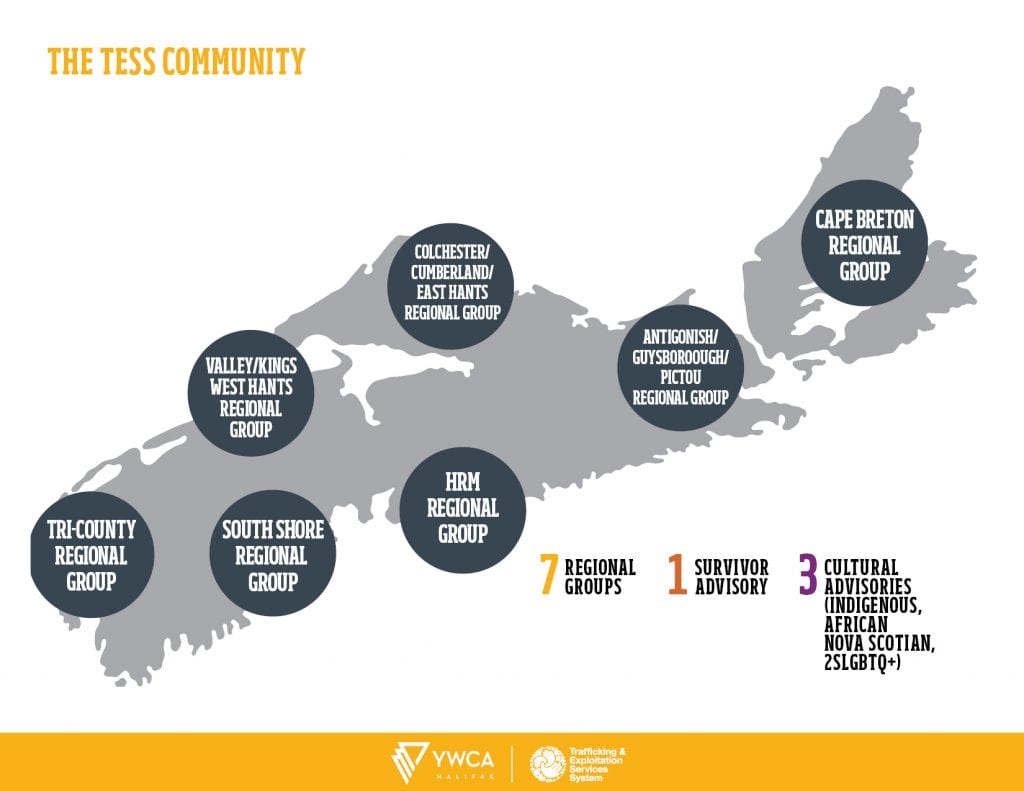Trafficking and Exploitation Service System (TESS) Partnership
The Trafficking and Exploitation Services System (TESS), is a multi-sector inter-agency provincial partnership of over 160 community leaders and professionals working with children and youth engaged in the sex trade across Nova Scotia. TESS is the extension of groundwork laid through Canadian Women’s Foundation funding from 2016 to 2021, and is currently funded by the Department of Community Services through until 2025.

The primary purpose of TESS is to mobilize communities for action against the commercial sexual exploitation of children (CSEC) and youth. TESS does this in a number of ways:
- Education & Training – Sharing resources, practices and information about CSEC
- Collaboration – Providing opportunities for agencies to collaborate on the development of programs and services
- Coordinate Action – Identify the needs of victims and survivors, and work together to fill those needs
- Improve Systemic Responses – Work with decision-makers and legislators to identify and improve systemic responses within the Criminal Justice, Child Welfare, Education and Health Systems
PRIORITIES
Within 7 Regional Working groups and 3 cultural advisories, the TESS partnership has identified the following priorities for action. These priorities range from broad to the specific actions. These actions have been categorized and ranked on importance by 56 TESS members.
TIER 1 – What is needed across the Province for all youth
- Rural emergency shelters for youth – to prevent and protect youth at-risk for exploitation due to homelessness
- A variety of long-term housing options across the province –including market rentals, coop housing, accessible ownership and second stage housing programs
- Addiction services – that are low barrier and easily accessible
Tier 2 – What is needed across the Province specifically for CSEC victims/survivors
- Services for boys and men who are victims of sexual exploitation, and who have been groomed into the business of perpetrating
- Emergency Funding to support survivors’ material needs
- Residential recovery options for complex cases
- Culturally specific programming – that draw from traditional knowledge, medicines and healing practice
- Case Management Tables for wrap around services
Tier 3 – What is needed by specific agencies/groups/advisories
- Professional development and clinical supervision for Peer Support Workers in a variety of organizational contexts
- More intersectional research to inform a holistic and critical discourse about gender, race, poverty and sexual exploitation coming from the system
VALUES
Although children and youth are our primary focus, TESS partners acknowledge that CSEC happens within the context of the adult sex trade, and therefore we require and value the expertise of adults who are currently or formerly involved, including those who identify as sex workers. Not all youth see themselves as victims of sexual exploitation, and that will impact how and where they access services and interact with systems. To be effective, responses to CSEC need to be reflective of the diversity of experiences and realities of all individual participating in the sex trade. Therefore, our survivor advisory is inclusive of all survivors.
Our survivor advisory has told us that they want programs and services which have the following characteristics:
- Participant-Directed
- Trauma-specific and -informed
- Focused on safety
- Collaborative and Wrap Around
- Incorporate Peer Support
TESS ACTIVITIES
Meetings – TESS Meetings are convened on a quarterly basis. Each of the 11 working groups sends 1-2 representatives to the Provincial Meeting to share information about what is happening across the province, and report on the activities of the groups. Also present at the Provincial meetings are those operating programs and services with a provincial mandate (generally managers, supervisors and funders). Provincial Meetings also host guests who wish to connect with the partnership to offer information or external resources. TESS Partners connect with each other via email, a monthly newsletter, and a closed Facebook group for internal communications.
Training – YWCA Halifax has developed a free training series for service providers, front link workers, and first responders which cover a wide range of topics related to CSEC.
Modules 1-4 include introductory topics such as language, context, risk, identification, best practice in service provision and collaboration.
Other Advanced Modules developed to include advanced topics such as the Criminal Justice Path, Supporting Impacted Families, and Regional Strategies.
Advanced Modules in Development include: Child Welfare System Responses, Advanced Counselling Techniques, Best Practice in Harm Reduction, Online Exploitation, and The Indigenous Experience of Exploitation
Public Education and Awareness – TESS has its own logo and public social media presence on Facebook, Twitter and Instagram.
TESS will be publishing a resource guide for service providers and caregivers of youth engaged in the sex trade, which will include key information about the issue and a service directory of TESS partner agencies. This will be available by May 2021.
Public awareness and engagement activities will be offered by TESS starting Spring 2021.
For more information or to connect with TESS Partnership, email TESS@ywcahalifax.com
